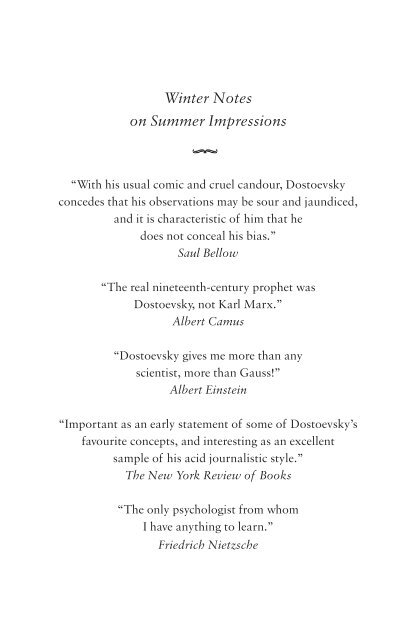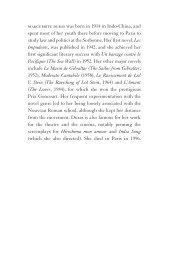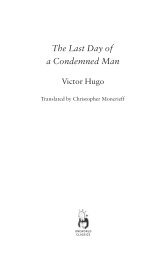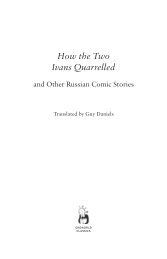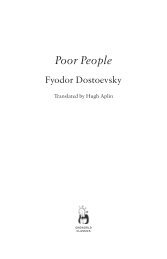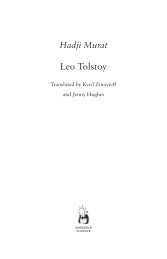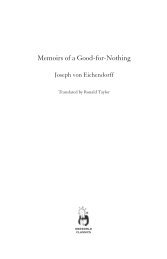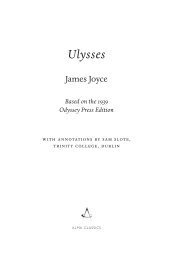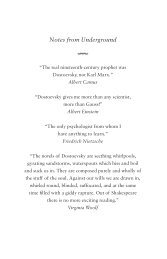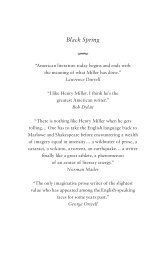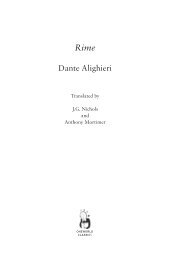Winter Notes on Summer Impressions - Alma Classics
Winter Notes on Summer Impressions - Alma Classics
Winter Notes on Summer Impressions - Alma Classics
Create successful ePaper yourself
Turn your PDF publications into a flip-book with our unique Google optimized e-Paper software.
<str<strong>on</strong>g>Winter</str<strong>on</strong>g> <str<strong>on</strong>g>Notes</str<strong>on</strong>g><br />
<strong>on</strong> <strong>Summer</strong> Impressi<strong>on</strong>s<br />
“With his usual comic and cruel candour, Dostoevsky<br />
c<strong>on</strong>cedes that his observati<strong>on</strong>s may be sour and jaundiced,<br />
and it is characteristic of him that he<br />
does not c<strong>on</strong>ceal his bias.”<br />
Saul Bellow<br />
“The real nineteenth-century prophet was<br />
Dostoevsky, not Karl Marx.”<br />
Albert Camus<br />
“Dostoevsky gives me more than any<br />
scientist, more than Gauss!”<br />
Albert Einstein<br />
“Important as an early statement of some of Dostoevsky’s<br />
favourite c<strong>on</strong>cepts, and interesting as an excellent<br />
sample of his acid journalistic style.”<br />
The New York Review of Books<br />
“The <strong>on</strong>ly psychologist from whom<br />
I have anything to learn.”<br />
Friedrich Nietzsche
<str<strong>on</strong>g>Winter</str<strong>on</strong>g> <str<strong>on</strong>g>Notes</str<strong>on</strong>g><br />
<strong>on</strong> <strong>Summer</strong> Impressi<strong>on</strong>s<br />
Fyodor Dostoevsky<br />
Translated by Kyril FitzLy<strong>on</strong><br />
ONEWORLD<br />
CLASSICS
<strong>on</strong>eworld classics ltd<br />
L<strong>on</strong>d<strong>on</strong> House<br />
243-253 Lower Mortlake Road<br />
Richm<strong>on</strong>d<br />
Surrey TW9 2LL<br />
United Kingdom<br />
www.<strong>on</strong>eworldclassics.com<br />
<str<strong>on</strong>g>Winter</str<strong>on</strong>g> <str<strong>on</strong>g>Notes</str<strong>on</strong>g> <strong>on</strong> <strong>Summer</strong> Impressi<strong>on</strong>s first published in Russian in 1863<br />
This translati<strong>on</strong> first published by John Calder Ltd in 1955<br />
English Translati<strong>on</strong> and Preface © Kyril FitzLy<strong>on</strong>, 1955<br />
This editi<strong>on</strong> first published by Oneworld <strong>Classics</strong> Limited in 2008<br />
Extra material © Ignat Avsey, 2008<br />
Cover Image: Richard Jenkins<br />
Printed in Great Britain by CPI Ant<strong>on</strong>y Rowe<br />
isbn: 978-1-84749-064-3<br />
All the pictures in this volume are reprinted with permissi<strong>on</strong> or presumed<br />
to be in the public domain. Every effort has been made to ascertain and<br />
acknowledge their copyright status, but should there have been any unwitting<br />
oversight <strong>on</strong> our part, we would be happy to rectify the error in subsequent<br />
printings.<br />
All rights reserved. No part of this publicati<strong>on</strong> may be reproduced, stored<br />
in or introduced into a retrieval system, or transmitted, in any form or by<br />
any means (electr<strong>on</strong>ic, mechanical, photocopying, recording or otherwise),<br />
without the prior written permissi<strong>on</strong> of the publisher. This book is sold<br />
subject to the c<strong>on</strong>diti<strong>on</strong> that it shall not be resold, lent, hired out or otherwise<br />
circulated without the express prior c<strong>on</strong>sent of the publisher.
C<strong>on</strong>tents<br />
Preface vii<br />
<str<strong>on</strong>g>Winter</str<strong>on</strong>g> <str<strong>on</strong>g>Notes</str<strong>on</strong>g> <strong>on</strong> <strong>Summer</strong> Impressi<strong>on</strong>s 1<br />
<str<strong>on</strong>g>Notes</str<strong>on</strong>g> 105<br />
Extra Material 115<br />
Fyodor Dostoevsky’s Life 117<br />
Fyodor Dostoevsky’s Works 130<br />
Select Bibliography 140
Fyodor Dostoevsky (1821–81)
Mikhail Andreyevich<br />
Dostoevsky, Fyodor’s father<br />
Mikhail Mikhailovich<br />
Dostoevsky, Fyodor’s brother<br />
Maria Fyodorovna<br />
Dostoevskaya, Fyodor’s mother<br />
Maria Dmitrievna<br />
Dostoevskaya, Fyodor’s first wife
Anna Grigoryevna Dostoevskaya,<br />
Fyodor’s sec<strong>on</strong>d wife<br />
Apollinaria Suslova,<br />
Fyodor’s mistress<br />
The Mariinsky Hospital in Moscow, where<br />
Dostoevsky was born in 1821
The Dostoevskys’ dacha in Darovoye (above), the apartment where<br />
Dostoevsky lived from 1861 to 1863 (bottom left), and which housed the<br />
offices of his journal Vremya (bottom right)
Preface<br />
1<br />
I<br />
t is usual to divide Dostoevsky’s literary activity into two distinct<br />
periods. The first opens with the publicati<strong>on</strong> in 1844 of a somewhat<br />
sentimental novel, Poor Folk, which brought him immediate literary<br />
renown and popular esteem; it closes with what in effect are<br />
his reminiscences of life as a political c<strong>on</strong>vict (House of the Dead),<br />
serialized in 1861–62 in his newly-founded periodical Vremya (Time).<br />
The sec<strong>on</strong>d period, we are invariably told, is ushered in with that<br />
oddly strident c<strong>on</strong>fessi<strong>on</strong> of pers<strong>on</strong>al guilt and inadequacy, in 1864,<br />
entitled <str<strong>on</strong>g>Notes</str<strong>on</strong>g> from the Underground, and finishes with the Pushkin<br />
Commemorati<strong>on</strong> Address delivered a few m<strong>on</strong>ths before his death.<br />
To state that Dostoevsky’s writings fall into two fairly definite<br />
periods is, of course, to state the obvious: the author’s attitude to<br />
the world, his choice of subject matter and his treatment of plot<br />
undergo in the 1860s a sudden and radical change. His earlier<br />
novels aim mainly at the entertainment of the reader; undeterred by<br />
c<strong>on</strong>siderati<strong>on</strong>s of verisimilitude or psychological probability, they<br />
glide over the surface of life without stopping to take soundings of<br />
what goes <strong>on</strong> underneath; they shun deep analysis and they lack the<br />
later Dostoevskian eagerness to rec<strong>on</strong>cile the acti<strong>on</strong>s of men with<br />
their c<strong>on</strong>sciences, c<strong>on</strong>ceived in terms of spiritual anguish.<br />
It is odd, however, that the opening of the sec<strong>on</strong>d and more<br />
characteristic phase of Dostoevsky’s literary activity should up till<br />
now have been so unanimously ascribed by all critics to <str<strong>on</strong>g>Notes</str<strong>on</strong>g> from<br />
the Underground. For about a year earlier, Dostoevsky, fresh from his<br />
first c<strong>on</strong>tact with Western Europe (which included a week in L<strong>on</strong>d<strong>on</strong><br />
and three in Paris), published in his periodical his impressi<strong>on</strong>s of<br />
that new and alien world, using them as a peg <strong>on</strong> which to hang<br />
most of the ideas which henceforth entered in varying degrees into<br />
everything he wrote, often expressed in phrases lifted from <strong>Summer</strong><br />
Impressi<strong>on</strong>s. Never again did he write anything which c<strong>on</strong>tained so<br />
vii
winter notes <strong>on</strong> summer impressi<strong>on</strong>s<br />
many of his thoughts <strong>on</strong> so many subjects in so few pages. It was<br />
as if, <strong>on</strong> the threshold of an entirely new epoch in his writing, he<br />
had decided to present his readers with a professi<strong>on</strong> of faith and<br />
a synopsis of his ideas. In fact, <strong>Summer</strong> Impressi<strong>on</strong>s, far from<br />
deserving their Cinderella-like treatment, ought to be regarded as a<br />
chrysalis out of which developed such masterpieces as The Devils,<br />
Crime and Punishment and The Karamazov Brothers, as well as the<br />
Diary of a Writer and the figures of Father Zosima and the Grand<br />
Inquisitor. Even the Pushkin Commemorati<strong>on</strong> Address, which was<br />
probably received with greater immediate acclamati<strong>on</strong> than anything<br />
Dostoevsky had ever written, c<strong>on</strong>tains little that is not adumbrated<br />
in <strong>Summer</strong> Impressi<strong>on</strong>s.<br />
The neglect from which <strong>Summer</strong> Impressi<strong>on</strong>s has so far suffered at<br />
the hands of literary critics is due to a variety of reas<strong>on</strong>s of which style<br />
is not the least. Dostoevsky, never a good stylist, had at that time <strong>on</strong>ly<br />
a very slender experience as a journalist and he was obviously trying<br />
to evolve a way of writing that would enable him to put his ideas<br />
across in the most digestible form he could think of. Unfortunately the<br />
most digestible form he could think of was <strong>on</strong>e which retained all his<br />
most glaring faults of style – repetitiveness, excessive colloquialism,<br />
discursiveness, slipshod grammar – and added two of its own: forced<br />
breeziness and waggish humour. The reader must make up his mind<br />
to disregard them. If he does, he will be amply repaid.<br />
2<br />
T<br />
he centre of dostoevsky’s ideas harbours a visi<strong>on</strong> of the world<br />
as a moral and spiritual unity, a “brotherly fellowship”, which<br />
must “exist in nature”, but cannot be artificially created (as both<br />
<strong>Summer</strong> Impressi<strong>on</strong>s and Father Zosima phrase it) and which<br />
expects, but most definitely does not demand, of its members a total<br />
resp<strong>on</strong>sibility for each other and for the community as a whole. It is<br />
a unity which makes each <strong>on</strong>e of us into a link in the infinite chain of<br />
causati<strong>on</strong> and which, though it may relieve each individual member<br />
of the human race of total resp<strong>on</strong>sibility and therefore total guilt,<br />
yet thrusts up<strong>on</strong> each of us the burden of a world c<strong>on</strong>science. It is<br />
this theme which Dostoevsky later expanded into an analytical novel<br />
(Crime and Punishment) and which later still he made both his Grand<br />
viii
preface<br />
Inquisitor and Father Zosima (The Karamazov Brothers) develop<br />
each in his own way.<br />
The fundamental tragedy of men, according to Dostoevsky, comes<br />
from two kinds of acti<strong>on</strong>s: acti<strong>on</strong>s that shatter world unity (and every<br />
crime committed against <strong>on</strong>e’s fellow men is an attempt to shatter it,<br />
as Raskolnikov in Crime and Punishment finds out to his cost) and<br />
acti<strong>on</strong>s which attempt to attain a synthetic unity by artificial means.<br />
This last he c<strong>on</strong>siders particularly dangerous, for men, c<strong>on</strong>sciously or<br />
subc<strong>on</strong>sciously aware of the dangers of “isolati<strong>on</strong>”, all clamour for<br />
unity and, in default of genuine brotherhood, are all too eager to accept<br />
a counterfeit model in the shape of socialism or the Catholic Church,<br />
which can offer nothing but the brotherhood of an “ant hill”. But, says<br />
Dostoevsky, both in <strong>Summer</strong> Impressi<strong>on</strong>s and in his capacity of Grand<br />
Inquisitor, even these men will gladly accept, for the alternative to an ant<br />
hill is a struggle of all against all, ending in “cannibalism”, when men<br />
will devour each other. Catholicism and socialism Dostoevsky regarded<br />
as being basically the same, both of them ultimately emanati<strong>on</strong>s of the<br />
Roman Imperial idea, which insisted <strong>on</strong> a purely mechanical, external<br />
unificati<strong>on</strong> of men, in the hope (at least <strong>on</strong> the part of the Catholic<br />
Church) that such a unificati<strong>on</strong> would in time give birth to true spiritual<br />
fellowship. This, thought Dostoevsky, was putting the cart before the<br />
horse, a mistake never committed by the Orthodox Church. In his<br />
interpretati<strong>on</strong>, the Orthodox Church expected unity to come of itself,<br />
sp<strong>on</strong>taneously and with no assistance from external human agencies;<br />
and when it came, true brotherhood would be established with no need<br />
for any rules or c<strong>on</strong>stituti<strong>on</strong>s.<br />
In essence, of course, this is merely the Slavophile versi<strong>on</strong> of<br />
Russian anarchism, which was c<strong>on</strong>ceived as a blend of freedom and<br />
love, the former without the latter leading to anarchy, as distinct from<br />
anarchism, or “isolati<strong>on</strong>” in the Dostoevskian sense, the latter without<br />
the former not, in fact, being able to exist. From Dostoevsky’s point<br />
of view, the importance of this attitude <strong>on</strong> the part of the Orthodox<br />
Church was that the Church, by making the Russian people adopt it,<br />
made Russia for ever different from the West. And it is just because the<br />
West is regarded by him as the true abode of “individualist isolati<strong>on</strong>”<br />
in c<strong>on</strong>trast to Russia’s strivings after a spiritual synthesis of the<br />
community, that the theme of Europe and her civilizati<strong>on</strong> recurs so<br />
frequently in Dostoevsky’s writings after his return to Russia.<br />
ix
winter notes <strong>on</strong> summer impressi<strong>on</strong>s<br />
His analysis of Western Europe, first outlined in the <strong>Summer</strong><br />
Impressi<strong>on</strong>s and thereafter relentlessly pursued through the pages of<br />
most of his books and particularly of his Diary of a Writer, presents<br />
a strange amalgam of Slavophile prejudice and Fourierist ideals, of<br />
religious utopianism and historical materialism, and of traditi<strong>on</strong>alist<br />
c<strong>on</strong>cepts expressed in terms of the Communist Manifesto. His earlier<br />
enthusiasm for Fourier – the cause, indeed, of his sojourn in the<br />
“House of the Dead” – and his acute awareness of those social and<br />
ec<strong>on</strong>omic forces that lie at the bottom of our cultural edifice, lead him<br />
to give certain historical events an interpretati<strong>on</strong> rendered familiar to<br />
us by Marxist writings. Thus he regards the French Revoluti<strong>on</strong> as a<br />
mere sham, benefiting no <strong>on</strong>e but the middle classes, the bourgeoisie,<br />
whom it enabled to obtain a firm grip <strong>on</strong> the proletariat in order to<br />
exploit it. The hollowness of the Revoluti<strong>on</strong>, he says significantly<br />
enough in his Diary of a Writer, was exposed by the executi<strong>on</strong> of<br />
Babeuf, the apostle of early communism.<br />
This attitude colours the whole of his approach to France, with<br />
which a large part of the book is c<strong>on</strong>cerned. Like Marx, he refuses<br />
to see in the Revoluti<strong>on</strong>’s, and later the Republic’s, slogan – Liberty,<br />
Equality, Fraternity – anything but a piece of bourgeois hypocrisy,<br />
a gigantic bluff; he c<strong>on</strong>siders, like Marx, that there can be no real<br />
freedom in Western Europe without ec<strong>on</strong>omic power; like Marx, he<br />
believes that proletarians are bound to unite – “form their own heap”<br />
– in defence of their own interests without the fraudulent pretence<br />
of speaking for humanity as a whole; he has the true Marxist (and<br />
Slavophile) c<strong>on</strong>tempt for Western liberalism and for all forms of<br />
parliamentary government, and, like Marx again, sees in the whole<br />
network of European social policy and behaviour nothing but<br />
the bourgeoisie’s frantic attempt to retain the status quo. But the<br />
proletariat, he says, is knocking at the door and <strong>on</strong>e day will force it<br />
open. Repudiated by the bourgeoisie and kept away from this world’s<br />
goods, it is ready to join in the class struggle and eager to repudiate<br />
the repudiators.<br />
It is obviously a theme that haunted Dostoevsky, for, having dealt<br />
with it in some detail in his <strong>Summer</strong> Impressi<strong>on</strong>s, he returned to it<br />
and repeated it with exasperating frequency in his Diary of a Writer<br />
many years later. No doubt his insistence <strong>on</strong> the dire fate awaiting the<br />
Western capitalist world, though often expressed in quasi-Marxist<br />
x
preface<br />
terms, was due to highly un-Marxist causes. It was due, in fact, to<br />
the wishful thinking of a Russian nati<strong>on</strong>alist obsessed by the fear of<br />
Western supremacy, and suffering, like so many Russians, from an<br />
acute inferiority complex vis-à-vis the West.<br />
As a result Dostoevsky fails to apply his semi-Marxist analysis<br />
to his own country, but, <strong>on</strong> the c<strong>on</strong>trary, claims that no proletarian<br />
revoluti<strong>on</strong> is possible in Russia for the simple reas<strong>on</strong> that the Russian<br />
proletariat is not <strong>on</strong>ly c<strong>on</strong>tented, but is becoming increasingly so.<br />
He does, however, in his <strong>Summer</strong> Impressi<strong>on</strong>s and later in his other<br />
works, raise <strong>on</strong>e point – <strong>on</strong>e of the most interesting in the book, for<br />
the reas<strong>on</strong> of touching up<strong>on</strong> perhaps the most fateful of all Russian<br />
nineteenth-century weaknesses: the loss of c<strong>on</strong>tact between the<br />
educated classes and the peasantry. It was this loss of c<strong>on</strong>tact which led<br />
to lack of understanding <strong>on</strong> both sides, to an attitude of supercilious<br />
superiority or guilty fawning <strong>on</strong> the part of the educated classes,<br />
and a half-sullen, half-c<strong>on</strong>temptuous withdrawal into their own<br />
community by the peasants. It resulted in the treatment of the latter<br />
by the former as if, to quote Dostoevsky, they were “enemy tribes”;<br />
it led to the rootlessness of the intelligentsia, and the Slavophile<br />
movement, which had Dostoevsky’s full and active sympathy, but<br />
whose ridiculous sides (like the wearing of bogus nati<strong>on</strong>al dress to<br />
placate the “enemy tribes”) he was quick to perceive, and it led to<br />
the phenomen<strong>on</strong> of “Westernizing expatriates” – Russians who felt<br />
more at home in Western Europe than they did in their own country,<br />
where they found no c<strong>on</strong>genial occupati<strong>on</strong> for themselves, stayed<br />
out of Russia as much as they could and were a c<strong>on</strong>stant butt for<br />
Dostoevsky’s rather heavy-handed sarcasm. It also led eventually to<br />
the Russian Revoluti<strong>on</strong>.<br />
3<br />
T<br />
he marquis de custine, whose very brief stay in Russia preceded<br />
Dostoevsky’s visit to Paris by a whole generati<strong>on</strong> and gave rise to<br />
a very l<strong>on</strong>g book, was shocked by the lack of freedom in Russia, the<br />
ubiquity of police informers, the arbitrariness of government and the<br />
slavish adulati<strong>on</strong> of the Emperor. He ascribed it all either expressly or<br />
by implicati<strong>on</strong> to nati<strong>on</strong>al character as well as to the country’s remoteness<br />
from the civilizing influence of Western Europe in general and of<br />
xi
winter notes <strong>on</strong> summer impressi<strong>on</strong>s<br />
France in particular. When, a quarter of a century later, in the summer<br />
of 1862, Dostoevsky came to Paris, he too was shocked, and what<br />
shocked him, so he c<strong>on</strong>fesses or implies in his Impressi<strong>on</strong>s, was lack of<br />
freedom in France, the ubiquity of police informers, the arbitrariness<br />
of government and the slavish adulati<strong>on</strong> of the Emperor. He ascribes<br />
it all to nati<strong>on</strong>al character, which produced the French bourgeois with<br />
their servile mentality.<br />
The impact made <strong>on</strong> Dostoevsky by England was strikingly<br />
different. For the moment (for he vacillated in this) he despised the<br />
French, and Paris, he wrote to a friend, bored him to death. But<br />
L<strong>on</strong>d<strong>on</strong> overwhelmed him. True, the picture he draws of it and of<br />
the British social scene is somehow reminiscent of Gustave Doré’s<br />
illustrati<strong>on</strong>s for Dante’s Inferno, and he is driven to describe it in<br />
apocalyptic terms, but at least there is no room in it for the meanness<br />
and pettiness which he found across the Channel. It is curious, too,<br />
that his judgement of the two countries completely reverses the more<br />
usual view, accepted as axiomatic by the world at large. It is France,<br />
not England, in his estimati<strong>on</strong>, that is a nati<strong>on</strong> of shopkeepers, and<br />
it is France that is hypocritical when it comes to moral standards,<br />
for she tries to slur over and, if possible, hide certain distasteful<br />
facts of life such as, for instance, irregularity of sexual behaviour,<br />
commercial dish<strong>on</strong>esty and the presence of poverty in the midst of<br />
plenty. Dostoevsky’s England has her share of social vices, but they<br />
are there for every<strong>on</strong>e to see: no attempt is made to c<strong>on</strong>ceal them. In<br />
fact, if France’s outstanding trait is hypocrisy, England’s is pride.<br />
It is clear, of course, that Dostoevsky did not form his impressi<strong>on</strong>s<br />
of England unaided. A week’s stay in L<strong>on</strong>d<strong>on</strong> could not have either<br />
supplied him with the necessary material or given him a sufficient<br />
insight into the British character, particularly as he knew no English.<br />
(He admits to his ignorance of the language in <strong>on</strong>e passage of the<br />
book, yet in another he claims to base certain of his c<strong>on</strong>clusi<strong>on</strong>s <strong>on</strong><br />
English newspaper reports.) The <strong>on</strong>ly man Dostoevsky is known to<br />
have visited in England was Alexander Herzen, the exiled Russian<br />
revoluti<strong>on</strong>ary and journalist, a sparkling pers<strong>on</strong>ality and a brilliant<br />
talker who could have had no difficulty in influencing Dostoevsky<br />
and imposing his views <strong>on</strong> him. It is Herzen’s views therefore that,<br />
more likely than not, form the basis of Dostoevsky’s analysis of the<br />
English character and of life in the country.<br />
xii
preface<br />
But quite apart from his influence <strong>on</strong> Dostoevsky’s views about<br />
England, Herzen is resp<strong>on</strong>sible for much of the c<strong>on</strong>tents of the<br />
<strong>Summer</strong> Impressi<strong>on</strong>s as well as for the form in which they were<br />
cast; the perusal of his Letters from France and Italy makes this<br />
abundantly clear. For these Letters suggested to Dostoevsky many<br />
of his reflecti<strong>on</strong>s <strong>on</strong> Russia and his few remarks <strong>on</strong> Germany, and<br />
provided him with some of the more biting images which he used in<br />
order to illustrate his comments <strong>on</strong> the French c<strong>on</strong>temporary social<br />
scene and the bourgeoisie’s mentality and habits.<br />
In general, Dostoevsky was readily influenced by c<strong>on</strong>temporary<br />
thinkers, and the game of tracing his ideas back to their original<br />
sources is not hard to play. Thus Petrashevsky inspired him with<br />
his early enthusiasm for Fourier, which, for all his later scoffing,<br />
c<strong>on</strong>tinued to colour his visi<strong>on</strong>; his c<strong>on</strong>cept of universality as the<br />
most typical attribute of the Russian character was first suggested<br />
to him by Belinsky, who himself owed it to Odoevsky; his noti<strong>on</strong><br />
of true brotherhood, realizable through a sp<strong>on</strong>taneous integrati<strong>on</strong><br />
of society and the individual, is due to K<strong>on</strong>stantin Aksakov and to<br />
Khomyakov; Samarin is resp<strong>on</strong>sible for his view of the Orthodox<br />
Church as the synthesis of the Roman Catholic principle of unity and<br />
the Protestant principle of freedom; the two alternatives of “ant hill”<br />
and “cannibalism” are derived from Herzen; so is most of his “semi-<br />
Marxism” and much of the language he uses to express his social and<br />
political philosophy, though there Petrashevsky’s c<strong>on</strong>tributi<strong>on</strong> looms<br />
large indeed; while, in so far as it differs from Herzen’s, his view of<br />
the West – its individualism, materialism and impending calamitous<br />
decline – and of Russia’s special place in the comity of nati<strong>on</strong>s and<br />
almost in the universe – her self-c<strong>on</strong>tained civilizati<strong>on</strong> and messianic<br />
destiny – can be found in all essentials in early Slavophile literature.<br />
Dostoevsky’s failure to fuse all these disparate elements into <strong>on</strong>e<br />
properly integrated whole till very late in life resulted in an ambivalence<br />
of attitude to the problems of his day which would have been fatal to<br />
a lesser man. That it did not prove fatal is due to a combinati<strong>on</strong> of<br />
qualities which include sincerity, psychological insight and immense<br />
literary gifts.<br />
As <strong>Summer</strong> Impressi<strong>on</strong>s owes so much to Herzen, a comparis<strong>on</strong><br />
between the two writers immediately suggests itself. At first sight, it<br />
does not favour Dostoevsky. For Dostoevsky lacks Herzen’s wit and<br />
xiii
winter notes <strong>on</strong> summer impressi<strong>on</strong>s<br />
lightness of touch, he is apt to elaborate what Herzen merely hints<br />
at; he ploughs, in fact, where Herzen sows. But then he lacks, too,<br />
Herzen’s sense of disillusi<strong>on</strong>ment, his scepticism and his religious<br />
agnosticism. This may be <strong>on</strong>e of the reas<strong>on</strong>s why, despite all Herzen’s<br />
advantages of superior wit, culture and educati<strong>on</strong>, it is not his but<br />
Dostoevsky’s name and Dostoevsky’s philosophy of life that has<br />
made the greater impact <strong>on</strong> humanity.<br />
xiv<br />
Kyril FitzLy<strong>on</strong>
<str<strong>on</strong>g>Winter</str<strong>on</strong>g> <str<strong>on</strong>g>Notes</str<strong>on</strong>g><br />
<strong>on</strong> <strong>Summer</strong> Impressi<strong>on</strong>s


